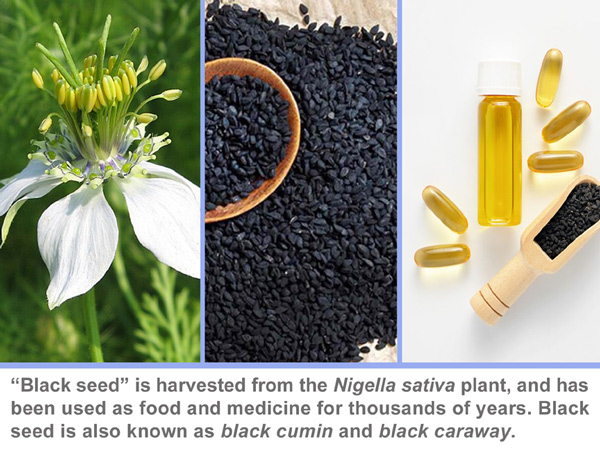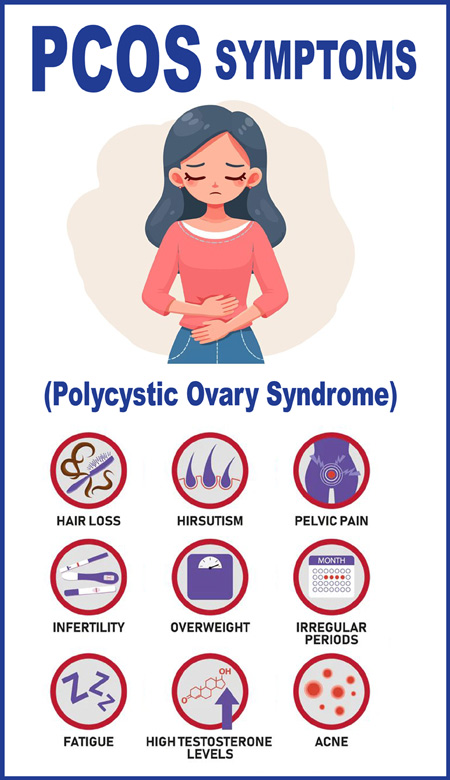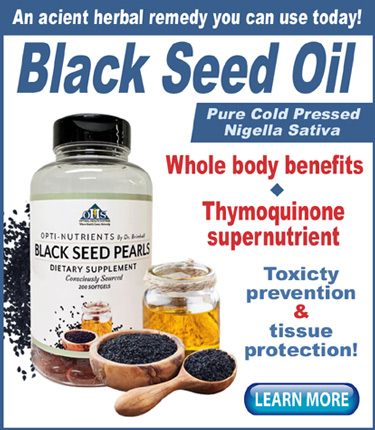According to a new study black seed oil is effective in treating a common, painful health challenge that many young women struggle with: polycystic ovary syndrome.
Polycystic ovary syndrome, or PCOS, is the most common endocrine disorder in women of reproductive age. In some countries it is estimated to be as high as one in four young women; however, the worldwide average is thought to be around 12% of the population.
PCOS is associated with irregular menstrual periods, infertility, obesity, diabetes, excess hair growth, acne and other hormonal difficulties.
The syndrome is named after cysts which form on the ovaries of some women with this condition; however, the presence of cysts is not a universal symptom, and they are not the underlying cause of the disorder.
As with most health conditions treatment with pharmaceuticals can provide some relief, but they don’t fix the underlying cause of the condition. Moreover, pharmaceutical treatment can cause side effects that may be more problematic than the condition itself.
Many patients with PCOS are also overweight and have dietary habits that exacerbate their condition.
Because of the wide-ranging benefits of black seed, supplementing with the herb offers a trifecta of hope: a reduction of symptoms, fixing the underlying problem, and improvement in overall health issues that are known to exacerbate the condition.
Black seed—many names, many benefits
“Black seed” refers to seeds from the Nigella sativa plant. Nigella sativa is an annual flowering plant in the Ranunculaceae family.
The genus name Nigella is a diminutive of the Latin niger—meaning “black”—which refers to the seed color. Sativa means “cultivated”.
Nigella sativa is native to eastern Europe and western Asia, and has also been naturalized over a much wider area of the Earth—including western Europe, northern Africa and further east in Asia to Myanmar.
While the general term “black seed” is the most common name of the herb, it is also known as black caraway, black cumin, nigella, kalonji and charnushka.
In the 2021 book, Black Seeds – Pharmacological and Therapeutic Applications, authors Andleeb Khan and Muneeb Rehman note the considerable history and applications of the herb:
“This plant has been mentioned in the written traditional medicinal texts of major civilizations like the Ayurveda, Siddha, Unani, Greek-Roman, Malay, Tibb-e-Nabwi, and Jewish texts.
“It has been extensively utilized for the treatment of liver, lung, kidney, gastric, and psychological disorders. Extensive research on N. sativa has revealed a broad spectrum of pharmacological properties comprising anti-microbial, anti-inflammatory, anti-diabetic, analgesic, spasmolytic, reproprotection, hepatoprotection, bronchodilaton, nephroprotection, and contraception.”
Today scientists have identified over 100 constituents in black seed. Though many of these constituents are yet to be methodically studied and documented, it is clear that black seed supplements—in the form of oil or powder—provide unique nourishment for human health and wellness.
Considering the long history and extensive use of the herb it is not surprising that it has been placed among the top ranked evidence-based medicines by pharmacologists and medical practitioners around the world.
In addition to serving as a natural medicinal aid, it is used as a spice in many cuisines.
New study
In the new study, published July 2024, researchers investigated the effect of Nigella sativa supplementation for treating PCOS symptoms in adolescents.
The research was conducted at Gonabad University of Medical Sciences in Gonabad, Iran, and the findings were published in the Journal of Ovarian Research.
The study, a randomized placebo-controlled trial, consisted of 114 adolescent girls with PCOS who had been referred to gynecologist clinics in Gonabad, Iran.
The participants were randomly provided 1000 mg per day of Nigella sativa supplements for 16 weeks. Meanwhile, control participants were provided 10 mg per day medroxyprogesterone—the progestin hormone commonly prescribed for abnormal menstrual bleeding and other PCOS symptoms.
Since the trial was for four months—with a goal of comparing Nigella sativa treatment with conventioinal treatment—researchers provided the medroxyprogesterone for ten nights per month from the 14th day of the menstrual cycle during each of the four months.
For assessing treatment, tests were conducted on ovarian volume (measured by ultrasound), anthropometrics, blood pressure, serum testosterone and serum Luteinizing hormone.
The researchers also monitored hirsutism severity (excessive body hair). All assessments were conducted at baseline and at the end of the study.
Previously-demonstrated benefits… and a new benefit
At the study’s conclusion improvements were observed in the black seed intervention group: Ovarian volume, serum testosterone and serum Luteinizing hormone were all significantly improved. Furthermore, the average difference in hirsutism score changes were improved in the black seed group.
In addition, the frequency of oligomenorrhea, menometrorrhagia and amenorrhea—different types of menstrual irregularities—were all significantly reduced at the end of 16 weeks of supplementing.
The researchers noted that while the study’s findings on the effect of Nigella sativa supplementation on hormone balancing were in line with the findings of previous studies, no study had yet investigated the effect of Nigella sativa supplementation on hirsutism.
“It seems that the mechanism of Nigella sativa effect on hirsutism might be related to the male sex hormone-reducing effects of Nigella sativa,” the researchers theorized in the study summary.
While stressing the need for follow-up research, the scientists were confident in their findings: “The results indicated that Nigella sativa supplementing could reduce ovarian volume, improve hormonal balance, and alleviate menstrual irregularities in adolescents with PCOS compared to medroxyprogesterone administration.”
The National Institutes of Health’s PubMed database archives hundreds of studies on black seed. The wide versatility is shown with studies demonstrating beneficial effects for diabetes, hypertension, asthma, allergies, and general antioxidant and digestive support.
An earlier 2024 study found black seed was effective in the treatment of blood disorders, and a notable 2020 study found black seed was effective in reducing Covid-19 recovery times.
– – –
You can find black seed oil in Opti Black Seed Pearls from Optimal Health Systems. Click the banner ad on this page to learn more.
– – –
Sources: Journal of Ovarian Research, Black Seeds – Pharmacological and Therapeutic Applications, JustAPedia.org (Nigella sativa).



